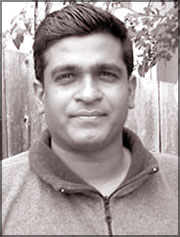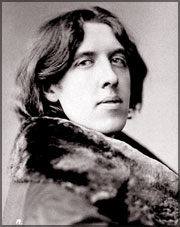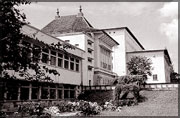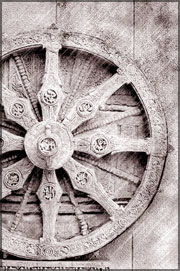Passionate Pen
Ex-writer suffering from a four-year writers’ block.
By Sajitha Prematunge
[email protected]
 He simply refused to be interviewed as a writer, insisting that he be
interviewed as an ex-writer. “It won’t be fair by other writers to refer
to me as a writer.” said Dr. Neil Fernandopulle. Born in Wattala, having
received his education in Wesley College, Universities of Colombo and
Peradeniya, it is hard to believe that this was the author of the award
winning collection of short stories - Shrapnel. He simply refused to be interviewed as a writer, insisting that he be
interviewed as an ex-writer. “It won’t be fair by other writers to refer
to me as a writer.” said Dr. Neil Fernandopulle. Born in Wattala, having
received his education in Wesley College, Universities of Colombo and
Peradeniya, it is hard to believe that this was the author of the award
winning collection of short stories - Shrapnel.
Its realism is so convincing and Sri Lankan culture portrayed in it
does not seem fabricated or laboured, that it was difficult to believe
that he was born and bread in Colombo.
He established himself as a writer at the young age of 17, when one
of his plays were performed at the Sydney Opera House, for the
International Festival of Young Playwrights, 1988. He was awarded the
Gratiaen in 1999 for Shrapnel and wrote This side of Serendipity, which
was never published in spite of the fact that it was shortlisted for a
second Gratiaen in 2004.
When asked why he had remained dormant for so long, he admitted that
he did not wish to write something inferior to Shrapnel. “I don’t want
to write another Shrapnel.” He explained that he wanted to do something
better in style and context.

“This is what happens when you pin your stars up so high, you can’t
reach them. I expect too much from my own writing.” He admitted that he
was not satisfied enough with This side of Serendipity to publish it. He
said that some people publish for the sake of it.
“For me to publish something, it should surprise myself. So far that
hasn’t happened. Moreover my career takes up most of my time.” He said
that writing has a lot to do with the workings of ones mind and if he
wishes to write again he requires a lot of time and freedom of mind.
“But I miss writing a lot whenever I attend a writers workshop. It’s
true that writers are born. If you are a writer you’ll never be
satisfied in not writing. Even when you don’t write you are pestered
with a persistent longing to write.”
He wrote Shrapnel when he was in his twenties. “As I was just
starting to see the world.” said he. “When I wanted to make a statement.
Now there is a sort of disillusionment, that making a statement doesn’t
actually work.”
He said he hopes to write something less ‘grounded’ something more
universal. And added that he has achieved this to some extent in This
side of serendipity. “It’s more about disillusionment. Where as the
intention of Shrapnel was to make a statement.”
He is a molecular biologist by profession, while entertaining his
award winning talent has just been a hobby. Being a scientist it was
surprising that he had never attempted to write a science fiction.
The only story in Shrapnel that is even remotely related to science
is Seed dispersal patterns of the Dipterocarps of Sri Lanka. “Writing
has always been an escape for me, an escape from science.”
He said that the reason he was never compelled to write science
fiction is because he lives it. As the co-founder of Genetech, dedicated
to genetic studies, he claims that his real life is more vivid and
grotesque than any novel. “Writing is nothing compared to what you see
in real life.”
Dr. Neil Fernandopulle said that this dichotomy of science and art
has been evident through out his life. He is a double degree holder,
with an Arts degree from Peradeniya. “I started off as a playwright. I
was in the university drama society, even at school I was involved in
theatre.”
Born and bread in Colombo, it was amazing, with how much ease he
described rural village life in Sri Lanka. He admitted that the real Sri
Lankan experience is not in Colombo, but for someone who was willing to
learn, just a few hours drive could get you into the country.
“It all depends on how much you are willing to learn from experience,
imbibe and sympathize. If you want to look at rural life from a distance
that’s also possible.” This is the perspective he adapts in the story
Dear Vichy in Shrapnel, the perspective of how a detached foreign
observer regards war.
He pointed out that an accusation levelled at most Sri Lankan writers
is that they attempt to write about rural village life without getting
their feet in the mud. “Which is in fact true. You have to be willing to
see things from their perspective.”
It was obvious that most of his stories were focused not only on war
but its side effects. “Authors generally write in a particular
environment. Every nook and cranny of the country, with regard to time
as well as space, is overwhelmed by war. It is insensitive to claim that
we should not write about it.”
He also explained that, a writer is a chronicler. What is left at the
end is not the historians account but the creative writers descriptions
of social phenomenons. “We know about the Russian revolution through Dr.
Zhivago by Boris Pastonet, we know more about war and peace from Tolstoy
than any other historian at the time.”
He further explained that the war has been going on in Sri Lanka for
so long that it had integrated into Sri Lankan society. “Innocence is
the first casualty of war. It’s a writer’s duty to discuss these
issues.” However he did identify the need to deviate from the
preoccupation of war, in order to gain international recognition.
“This is one way Sri Lankan English writers have failed.” He said
that there are more than enough themes to dwell on, if one cares to take
them up, such as gender discrimination, gender violence and incest.
“As a geneticist I see these every day. But war always take
precedence. However social degradation is a worse calamity than war.”
When questioned about challenges of writing,” he explained that one
can never make a living out of it. Everyone who can write a little tries
to publish something, which may not be up to standard. Moreover he
pointed out that the Sri Lankan English readership is small.
“Even cliquish. It discourages writers in terms of sails. Getting
published internationally is considered as the bench mark of a writer,
with which I do not totally agree.” He explained that Sri Lankans write
about Sri Lanka to only 2% of the population, missing out on almost 98%.
He explained that the language barrier is one of the greatest obstacles
Sri Lankan English writers face.
“At the End of the day you feel very empty. People whom you write
about may never be able to read your stories and that’s sad.” He pointed
out that all these constraints add up when you finally sit down to
write. As a final word of advice to amateur writers he suggested that
they should read.
“It’s the best time to do it - when you are unattached and young.
Afterwards you won’t have enough time to read let alone write.”
He explained that most amateur writers do not publish their work.
“Writing should go beyond writing for personal purposes. Being published
is the best incentive for a writer. Moreover try to be different. There
are too many writers who are alike.”
Oscar Wilde - Rich and dramatic portrayals
 Oscar Wilde was born on October 16, 1854 in Dublin to Lady Jane
Francesca Wilde and Sir William Wilde. Lady Jane was a poet and
journalist and Sir William was an Irish antiquarian, gifted writer, and
specialist in diseases. Oscar studied at Portora Royal School,
EnnisKillen in County Fermanagh, Trinity College, Dublin and Magdalen
College, Oxford. Oscar Wilde was born on October 16, 1854 in Dublin to Lady Jane
Francesca Wilde and Sir William Wilde. Lady Jane was a poet and
journalist and Sir William was an Irish antiquarian, gifted writer, and
specialist in diseases. Oscar studied at Portora Royal School,
EnnisKillen in County Fermanagh, Trinity College, Dublin and Magdalen
College, Oxford.
In 1878 Wilde received his B.A. and in the same year he moved to
London. His lifestyle and humorous wit soon made him the spokesman for
Aestheticism, the late 19th century movement in England that advocated
art for art’s sake.
He worked as an art reviewer, lectured in the United States and
Canada, and lived in Paris. Between the years 1883 and 1884 he lectured
in Britain. From the mid 1880s he was a regular contributor for Pall
Mall Gazette and Dramatic View.

In 1884 Wilde married Constance Lloyd, and to support his family
Wilde took up the job as editor of Woman’s World during 1881-89. In 1888
he published The Happy Prince and Other Tales, fairy-stories written for
his two sons. Wilde’s marriage ended in 1893.
Wilde made his reputation in the theatre world between the years 1892
and 1895 with a series of highly popular plays. Lady Windermere’s Fan
dealt with a blackmailing divorce driven to self-sacrifice by maternal
love.
In A Woman of No Importance an illegitimate son is torn between his
father and mother. An Ideal Husband dealt with blackmail, political
corruption and public and private honour. The Importance of Being
Earnest was about two fashionable young gentlemen and their eventually
successful courtship.
Before his theatrical success Wilde produced several essays. His two
major literary-theoretical works were the dialogues “The Decay of Lying”
and “The Critic as Artist”.
Although married and the father of two children, Wilde’s personal
life was open to rumours. His years of triumph ended dramatically, when
his intimate association with Alfred Douglas led to his trial on charges
of homosexuality (then illegal in Britain).
He was sentenced to two years hard labour for the crime of sodomy.
Wilde was first in Wandsworth prison, London, and then in Reading Gaol.
During this time he wrote De Profundis (1905), a dramatic monologue and
autobiography, which was addressed to Alfred Douglas.
Oscar wrote “The Ballad of Reading Gaol, A response”. It was
published shortly before Constance’s death in 1898. When a recurrent ear
infection became serious several years later, meningitis set in, and
Oscar Wilde died on November 30, 1900.
Numerous books and articles have been written on Oscar Wilde,
reflecting on the life and contributions of this unconventional author
since his death over a hundred years ago.
A celebrity in his own time, Wilde’s indelible influence will remain
as strong as ever and keep audiences captivated in perpetuity.Oscar
Wilde’s rich and dramatic portrayals of the human condition came during
the height of the Victorian era that swept through London in the late
19th century.
Compiled by Ishara Mudugamuwa
[email protected]

Change

I’m now going,
To turn over a new page,
In the book of my life,
And step beyond the comfort zone,
Built around my home and the campus,
Where I’ve been spending my days,
In stifling solitude,
Which, however, induced my creativity,
And sharpened my literary prowess....
From the relative tranquility,
Of the countryside,
Soon I will be moving,
Into the maddening hustle and bustle,
Of the metropolis,
Abounding with men, women and vehicles,
Always on the move....
And now I’m on the fence,
Trying to make up my mind,
To accept the risky change,
And acclimatize myself,
To the alien mercurial landscape.
By Jayashantha Jayawardhana
The King and I
The King and I we were both much alike
Black or white does it matter? ‘tis a child
Then what makes a king, a king? And I
A grain of sand under trodden foot lie?
Though born alike I was left, he went right
For fate the fool shone on him, not I
Love and wealth unlike mine were his friends
When hate and revenge were my only friends
But I am rich than a King because I
Am free at heart have no riches to pry
And then I am King and he is I
For a thousand gems spent he cannot buy.
Krishanthi Anandawansa
Depart for fresh lease of life!
Three score six gone by

And one more lap to go
If the sage with the
Ancient Ola leaves
Read them right
Future is already written down
For the big and small
The mighty and simple
One and all must go
When the chakra stops turning
It is how the samsara chakra rolls
The good and bad one does
That ensures the fresh lease of life
One must retire to commence a fresh lease
But leaving the loved ones sad
Oh! No it’s not a big deal
At one time or other
Each person has to leave
But what matters most
Are the duties fulfilled?
Fulfil your duties by the
Kith and kin, friends and foes
You go with a light heart
Leaving no remorse
But back for another turn.
A turn to exit in the samsara chakra!!
Psyche up to that
For there alone
Thathagatha taught mankind
Lies supreme nibbhana.
Metthananda Wijekulasuriya
My passing gaze
(A reminiscence)

Now hangs my passing gaze with comrades proud,
Softly rousing a fond brave strain to stride
In grey of blue and khaki combat drill,
With bawl and leap and squeezed trigger-shot,
Across a shell-scarr’d point up lone tree hill
Breathless, on dappled, battle-stomping ground.
Relentless guidance blowing shrill to strive,
So oft we’d scale in booted suns to peak,
Suffer blind cloud burst, raging jungle tide;
Clammy, we cheer in dank and bruised kit;
For, tradesmen all, on course to best as one,
To serve tall our birth-land through dark and day.
Now whisp’ring spin wheels sweep a home proud hill,
Where maiden rifles proved their aim until.
By Andrew M. Dep
|
